Everyone knows that they love their greens, but can chickens eat cabbage? The short answer is yes, they can! Cabbage is safe for chickens to eat, and it has lots of essential nutrients, making it a great choice as a treat.
Cabbage contains vitamins A, B6, C, K, and E and important minerals like calcium and magnesium. This means that it’s an excellent source of nutrition for your flock. Plus, since cabbage is about 90% water, it helps keep them hydrated in hot weather.
That said, you should only feed your chickens a little cabbage at a time – it can cause digestive issues if eaten in large quantities. This article will cover everything you need to know about feeding your chickens cabbage, as well as some of the benefits it can provide for them.
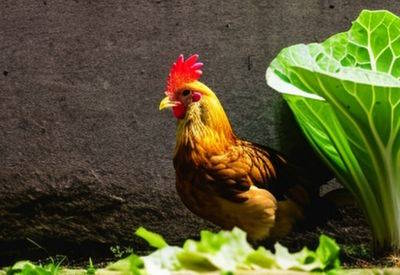
Can chickens eat cabbage?
Treats like cabbages can provide chickens with extra nutrition and mental stimulation. Chickens love to peck and scratch at the leaves and stems of cabbages, making them a great addition to your chickens’ diet.
However, treats should only be fed sparingly; overfeeding your chickens will lead to obesity which can cause more health problems down the line.
Chickens can eat both the leaves and stems of the cabbage plant. The leaves are usually softer than the stems, so they are easier for chickens to chew on; however, both parts are perfectly safe for them to consume. Make sure you cut up larger pieces, so they don’t choke on them.
[ChickenAffiliate]
The benefits of eating cabbage for chickens
Cabbage is an excellent option for chickens, as it offers a variety of health benefits. Let’s look at five ways that cabbage can benefit your backyard chickens.
Improved Digestive Health
Cabbage contains high levels of fiber, which helps keep chickens’ digestive systems running smoothly. Fiber helps move food through the digestive tract, preventing problems like constipation and diarrhea. Plus, the combination of fiber and water in cabbage makes it a great natural laxative.
Healthy Skin & Feathers
The vitamins and minerals in cabbage are important for maintaining healthy skin and feathers in chickens. Vitamin A helps strengthen feathers, while vitamin E promotes healthy skin and reduces feather loss. Cabbage also contains calcium, vital for bone health and strong eggshells.
Reduced Risk of Disease
The antioxidants found in cabbage can help reduce the risk of disease in chickens. Antioxidants fight off free radicals that cause cell damage, helping keep chickens healthy and reducing their risk of diseases such as coccidiosis and avian influenza.
Stronger Immune System
The vitamins found in cabbage can help boost chickens’ immune systems by increasing their resistance to disease-causing bacteria and viruses. Vitamin C helps protect against colds, while vitamin B6 supports the production of red blood cells, which help deliver oxygen throughout the body’s cells.
Maintain Healthy Weight
Eating too many fatty or sugary foods can cause chickens to gain weight, leading to unhealthy conditions like obesity. Feeding them cabbage instead can help them maintain a healthy weight while still getting the necessary nutrients from their diet. Plus, because it’s low in calories, it won’t add extra fat to their bodies.
Things to watch out for when feeding cabbage to chickens
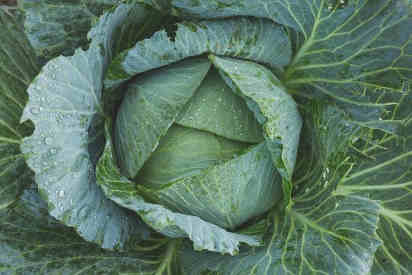
Cabbage is a great source of nutrition for chickens. It provides many vitamins, minerals, and other essential nutrients for keeping chickens healthy and happy. However, there are some things to watch out for when feeding your chickens cabbage. Here are three tips to help ensure your chickens get the most out of their cabbage.
Pesticides
When sourcing your cabbage, ensure it is organic and has not been treated with pesticides or other chemicals. These can be toxic to chickens, so always opt for organic whenever possible. If you have a garden at home, growing your own cabbage is the best way to ensure that it is free of harmful substances.
Moldy Cabbage
You should also be sure that the cabbage you are feeding your chickens is fresh and not moldy. Moldy cabbage can cause digestive upset in chickens, so it’s best avoided altogether. Check the cabbage leaves before feeding them to your flock, and discard any that look discolored or feel slimy.
Overfeeding
As with any food, moderation is key when feeding cabbage to chickens. Cabbage should be given as a treat rather than a staple in their diets; too much of this leafy vegetable can lead to nutritional deficiencies if not balanced with other foods like grains or insects.
Monitor how much cabbage each chicken in your flock eats and adjust accordingly if needed.
How often should chickens eat cabbage?
If you want to feed your chickens cabbage, it should be a treat rather than their staple diet. Cabbage is a healthy treat since it provides them with minerals, vitamins, and dietary fiber; however, they should only consume it occasionally.
The recommended amount of fruit and vegetables to feed them is around 10% of their total diet, and cabbage should be a small part of this. It’s best to switch up their usual diet with occasional servings of cabbage as part of a balanced poultry diet.
How to prepare cabbage for feeding to chickens
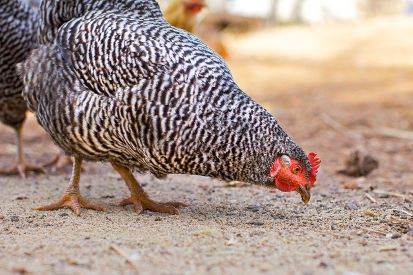
If you are looking for a way to give your chickens something tasty and nutritious, look no further than cabbage. Cabbage is full of vitamins and minerals, making it a great addition to your chicken’s diet. Here’s a quick guide on preparing cabbage for feeding chickens.
Wash First
The first step in preparing cabbage for your chickens is washing the cabbage thoroughly. Ensure you rinse any dirt or debris before serving it to your flock. It is also important to inspect the leaves for any signs of pests or diseases that may be present on the plant.
Chop into Small Pieces
Once you have washed the cabbage, you will want to chop it into small pieces so that your chickens can easily eat it. Depending on your preference, you can either cut it into thin strips or cubes. If you are cutting larger pieces, ensure they are about the size of your chicken’s beak so they can easily pick them up.
Serve Raw or Cooked
You can serve the chopped cabbage raw or cooked – whichever your chickens prefer. If you choose to cook the cabbage, lightly steam it in boiling water until just softened but not mushy. This will help preserve some of the nutritional value while making it easier for your chickens to digest.
Eat All Parts
When preparing cabbage for feeding to chickens, you can include all parts – leaves and stalks included! The stalks may be a bit tough, so leave them out if this is an issue with your flock.
Also, remember that while most chickens love eating raw cabbage leaves, some will prefer cooked ones. Try both and see which one they like best.
Can baby chickens eat cabbage?
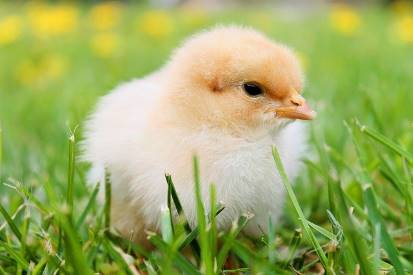
Baby chickens can eat cabbage, but you should wait until they are six weeks old. Cabbage should be cut into small pieces when offered to baby chicks as they cannot chew large pieces.
It provides them with a source of vitamins, minerals, and fiber. However, it should only be offered once a week during the first few months of their lives as they have yet to develop strong digestive systems like adult chickens.
What types of cabbage can chickens eat?
Vegetables are an important part of a healthy diet for chickens. Not only do they provide essential vitamins and minerals, but they also add variety to their meals. Cabbages, in particular, are a great option for your chickens because they contain lots of beneficial nutrients. But what type of cabbages can chickens eat? Let’s take a closer look.
Green Cabbage
Green cabbage is one of the most popular types of cabbage for chickens. It provides the birds with plenty of vitamin A, vitamin C, calcium, and dietary fiber.
Green cabbage also contains antioxidants that help keep your chickens healthy and strong. Feed your chickens small pieces of green cabbage with the stems removed for best results.
Red Cabbage
Red cabbage is similar to green cabbage in terms of nutrition and taste, but it has a slightly higher vitamin A content and contains more antioxidants than its green counterpart.
Red cabbage should be served the same way as green cabbage – small pieces with no stems attached – to ensure that your chickens get all the nutritional benefits from this tasty vegetable.
Savoy Cabbage
Savoy cabbage is another variety that is great for feeding your chickens. It has a milder flavor than regular cabbages, but it still contains plenty of vitamins and minerals that are good for your birds’ health.
Savoy cabbages should be chopped into small pieces before being added to your chicken’s feed, so they don’t choke on them.
What other vegetables can chickens eat?
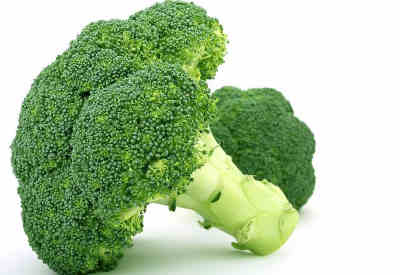
Now you know that cabbage is a great way to supplement your chickens’ diets, but did you know there are plenty of other vegetables chickens can eat as well? Here are five nutritious and tasty veggies that your feathered friends will love.
Broccoli
Broccoli is a great source of vitamins and minerals, including calcium, magnesium, and vitamin A. It can be served raw or cooked and makes a nice addition to any chicken’s diet.
Read More: Can Chickens Eat Broccoli? 6 Amazing Benefits
Asparagus
Asparagus is not only delicious for humans; it’s also an excellent treat for chickens. Asparagus contains high levels of fiber, which helps keep chickens healthy and regular. It can be served raw or cooked and should always be chopped into small pieces before feeding to your chickens.
Read More: Can Chickens Eat Asparagus? 5 Awesome Benefits
Green Beans
Green beans are packed with nutrients such as vitamin C, folate, iron, and potassium. They make a great snack for chickens because they’re easy to digest and low in fat. Plus, they contain lots of fiber which encourages healthy digestion in birds.
Read More: Can Chickens Eat Green Beans? 4 Important Benefits
Brussel Sprouts
Brussel sprouts may not be the most popular vegetable among humans, but they’re one of the healthiest choices you can feed your flock! These little green balls are jam-packed with essential vitamins and minerals such as folate, vitamin K, calcium, and phosphorus – all important nutrients for keeping your birds healthy and happy.
Read More: Can Chickens Eat Brussel Sprouts? 5 Fantastic Benefits
Peas
Peas are a fantastic source of protein for chickens. They also contain important vitamins like vitamin B6, niacin, and riboflavin – all vital for proper growth in birds. Peas can be served cooked or raw, depending on what your birds prefer.
Read More: Can Chickens Eat Peas? 5 Amazing Benefits
Can chickens eat cabbage – final thoughts
While feeding your chickens cabbage has many benefits; it should never be given as a main food source or in large quantities. Instead, think of it as a special treat that provides some extra nutrition now and then.
It’s always best practice to consult a veterinarian before drastically changing your chicken’s diet. Be sure to do that before introducing any new foods into their diet plan.
Related Articles:
